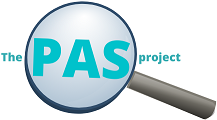Phonological Awareness for Speech

The Phonological Awareness for Speech (PAS) project
This PhD research study is being carried out by Jo Baker, a Speech and Language Therapist and PhD candidate at Newcastle University. The project is supervised by Professor Helen Stringer, Professor Cristina McKean and Dr Stephanie van Eeden.
Watch Jo talk about the research project in the video below - it'll only take 3 minutes!
Project summary:
- Speech sound disorder (SSD) is when children have difficulty producing speech sounds correctly, making their speech difficult to understand.
- Children with SSD are at risk of long-term academic and socioemotional difficulties making early identification and intervention from a Speech and Language Therapist crucial.
- There are multiple evidence-based interventions for phonological disorder, one being phonological awareness intervention.
- Phonological awareness intervention is widely provided to children with phonological disorder and current evidence has shown that it helps to resolve speech production errors in some children with phonological disorder.
- However, not all children respond to phonological awareness intervention in the same way and the relationship between speech production and phonological awareness is unclear. The aim of this project is to investigate the effects of phonological awareness intervention on the speech production of children with phonological disorder.
Method
- Children aged 3,11 to 5,11 years with phonological disorder were recruited through Speech and Language Therapy services in the North East.
- This research followed a single case experimental design (SCED). This means that each participant's expressive phonology (speech) was assessed multiple times before intervention, during a baseline phase, then throughout intervention, and then immediately after intervention.
- The children will took part in an experimental study consisting of three phases:
- Baseline assessment: children were assessed on measures of speech and language multiple times.
- Intervention: Children received phonological awareness intervention in small groups for 12 weeks.
- Consolidation and follow-up: Children’s speech and language was re-assessed after a 12-week break following intervention.
- Children's expressive phonology was assessed using a picture naming assessment called the DEAP Phonology assessment.
- Outcomes were analysed to inform whether children who used different types of speech errors (phonological processes) responded differentially from intervention.
- We hypothesised that structural errors would resolve more rapidly and to a greater degree than systemic errors.
- We predict that the outcomes will support clinical decision-making, helping clinicians to identify which children are most likely to benefit from this intervention approach.
Funding and sponsorship
This study is funded by the Northern Ireland and North East (NINE) Doctoral Training partnership:
The study is sponsored by Northumbria Healthcare NHS Foundation Trust.
Study registration DOI: https://doi.org/10.17605/OSF.IO/2RCJE
Linked in: https://www.linkedin.com/in/jo-meadhbh-baker/
